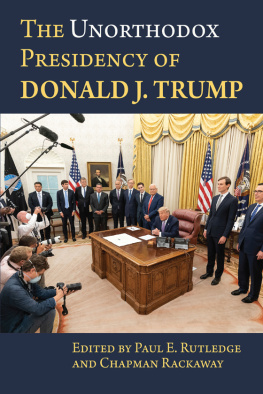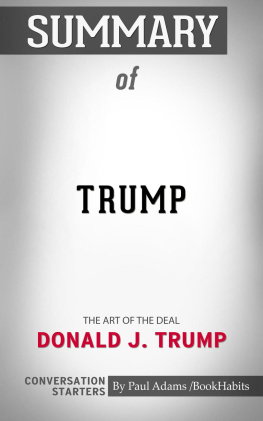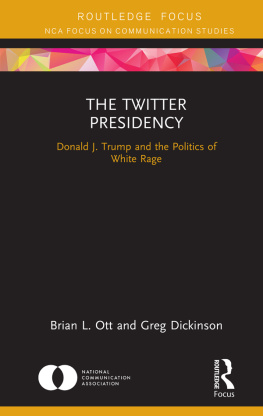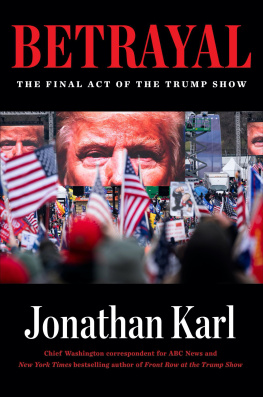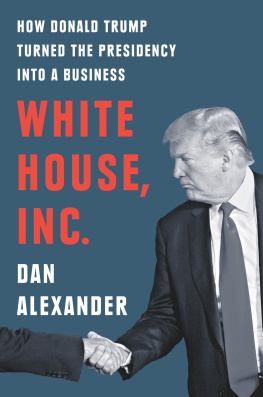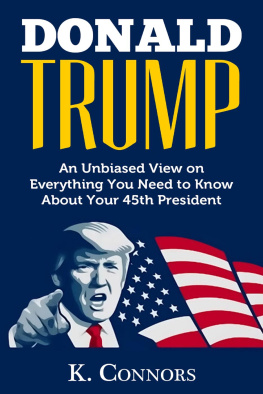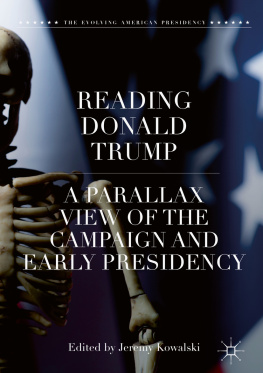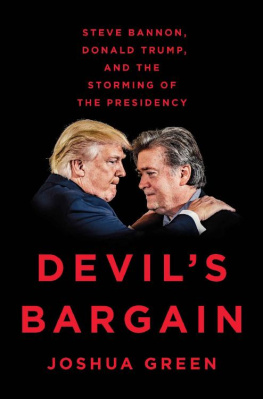The Unorthodox Presidency of Donald J. Trump
The Unorthodox Presidency
of Donald J. Trump
Edited by
Paul E. Rutledge
and
Chapman Rackaway

University Press of Kansas
2021 by the University Press of Kansas
All rights reserved
Published by the University Press of Kansas (Lawrence, Kansas 66045), which was organized by the Kansas Board of Regents and is operated and funded by Emporia State University, Fort Hays State University, Kansas State University, Pittsburg State University, the University of Kansas, and Wichita State University.
Library of Congress Cataloging-in-Publication Data
Names: Rutledge, Paul E., editor. | Rackaway, Chapman, editor.
Title: The unorthodox presidency of Donald J. Trump / edited by
Paul E. Rutledge, and Chapman Rackaway.
Description: Lawrence: University Press of Kansas, 2021 | Includes bibliographical references and index.
Identifiers: LCCN 2020048507
ISBN 9780700632312 (cloth)
ISBN 9780700632329 (paperback)
ISBN 9780700632336 (epub)
Subjects: LCSH: Trump, Donald, 1946 | United StatesPolitics and government2017 | United StatesForeign relations2017 | PresidentsUnited States.
Classification: LCC E912 .U56 2021 | DDC 973.933092dc23
LC record available at https://lccn.loc.gov/2020048507.
British Library Cataloguing-in-Publication Data is available.
Printed in the United States of America
10 9 8 7 6 5 4 3 2 1
The paper used in the print publication is acid free and meets the minimum requirements of the American National Standard for Permanence of Paper for Printed Library Materials Z39.48-1992.
Rutledge: To Amy, Luke, Ben, Ryan, Max, and Jack, who inspire me every single day.
Rackaway: For Andrea, Madison, Micheala, Will, and Catemy love to you all, for always.
Contents
Paul E. Rutledge and Chapman Rackaway
Chapman Rackaway
Wayne Steger
Russell Brooker
Tyler J. Hughes and Lawrence A. Becker
Paul E. Rutledge
Rebecca M. Eissler
Jonathan Lewallen
JoBeth Surface Shafran and Heather T. Rimes
Thomas Rogers Hunter
Burdett Loomis
Matthew Eshbaugh-Soha and Joshua P. Montgomery
Roy T. Meyers
Christopher Olds
Jeffrey S. Peake
Paul E. Rutledge and Chapman Rackaway
Acknowledgments
RUTLEDGE
I began my academic career in 1999 as a first-generation college student who did not know the first thing about achieving success in college. I owe more than I could ever repay to Reinhard Heinisch and Raymond Wrabley, who during my time at the University of Pittsburgh at Johnstown saw potential in me that I did not know I had. I also wish to thank Robert DiClerico, who provided invaluable mentorship at West Virginia University and without whom none of what I have accomplished would be possible. I thank the great colleagues at the University of West Georgia, for their constant support and collegiality. While the entire department is more collegial than I could ever imagine, especially noteworthy is my coauthor, Chapman Rackaway. Finally, I thank my father, Ron Rutledge, who probably never imagined that his love of politics and the American presidency in particular had such an effect on me.
RACKAWAY
In 2017, I made the decision to leave an institution where Id worked for a decade to move to the University of West Georgia. One of the unexpected side benefits of making the move was getting to be in a larger department with great scholars who helped me reinvigorate my research agenda. One of those scholars, Paul Rutledge, has become my coeditor here and Im thrilled to be able to have my name on a volume alongside his.
Edited volumes like this one are a true team effort. And the team weve been able to assemble in this book includes individuals for whom I have a deep and abiding respect. To every one of the authors, whether youve been a friend and mentor or someone who I have only recently come to know, Im grateful for your willingness to contribute to this important work.
This work also could not have been done without the stalwart help of the board and staff at the University Press of Kansas. Having lived for some time in Kansas and worked in its university system, its a point of pride for me to publish with UPK. David Congdon in particular deserves our thanks as our acquisitions editor.
Introduction
Paul E. Rutledge and Chapman Rackaway
The presidency of Donald Trump has been unorthodox from the initial stages of his campaign. To launch his campaign, he descended via a golden escalator in grand representation of his transition from businessman to candidate for the presidency and proceeded with an unprecedented onslaught on the norms of American democracy and political correctness that was equal parts brazen and in character for an individual well-known for his made-for-television personality. Prior to becoming a formal candidate for the presidency, Trump had put himself in the political limelight by flirting with the possibility of running for office several times, only to back out before officially entering the race. Trump had been an outspoken voice on political issues for quite some time, most notably championing the birther movement that insinuated that President Barack Obama was not born in the United States and thus was ineligible to serve in the Oval Office. Such conspiracy theorydriven and seemingly racist rhetoric as a private citizen would not be muffled with the inception of his campaign. Trumps declaration that he intended to seek the Republican nomination for president declared his intention to continue these patterns, railing against illegal immigrants crossing the border from Mexico as criminals and rapists. Later in the primary campaign, he openly mocked the physical disability of a reporter who had criticized him. Trumps banter with his political rivals resorted to elementary if not entertaining name-calling resembling that of a playground bully whose victims, such as Low Energy Jeb (Bush), Lyin Ted (Cruz), and Little Marco (Rubio), ran more conventional, overshadowed, and eventually ineffective campaigns.
Trumps penchant for playground bullying made for great television, which resulted in a tremendous amount of free advertising that his rivals were never able to overcome. Candidate Trumps success in spite of his obvious flaws questioned the established conventional wisdom of primary elections. Trumps fundraising efforts were quite low compared to those of other candidates. Further, Trump eschewed the use of his personal fortune mostly because there was no need. The campaign, assisted by an onslaught of news coverage, was remarkably efficient at obtaining primary victories with a small campaign war chest. Trumps preference for petty insults and his success in spite of a deficiency in campaign funds or organization would also continue into the general election, where he defeated Democratic presidential nominee Hillary Clinton in the Electoral College despite losing the popular vote by nearly three million votes. The victory was unquestionably one of the greatest upsets in the history of presidential elections. The unorthodox nature of the campaign led to an equally unconventional turnout among lesser-educated white Americans in the Rust Belt, questioning much of the orthodoxy surrounding both polling and election forecasting.
It is clear that Donald Trump, the candidate, exemplified a nontraditional version of American politics. He was a candidate who eschewed the norms of campaign procedure, political correctness, and, in the worst cases, human decency in favor of a rough-and-tumble, take-no-prisoners approach that appealed to those who felt marginalized in a changing society. At the same time, the constitutional design of the presidency has seen political outsiders, even if not as outlandish, rise to the office of the presidency before and has maintained stability. The norms of the office have survived challenge, and the institution persists. A disruptive, outsider candidate with eccentric views has the potential to win the office of the presidency. We have seen that before in American politics. However, never has such a candidate been so alien to political norms. The presidency of Donald Trump represents, in the history of the United States, the most significant test of the constitutional design and boundaries on the office of the presidency by an occupant who is antithetical to everything in its past. As the United States nears the end of Trumps first term, the questions scholars must ask include: To what extent has the Trump presidency been unorthodox? Has the institution of the presidency changed as a result of the Trump presidency? Has the actual operation of the presidency, regardless of the personal penchant for unorthodox behavior of the incumbent, been unorthodox? Finally, has the shock to the system presented by the Trump presidency altered the office of the presidency moving forward? We seek, with the contributions of our esteemed colleagues, to provide insight into these questions throughout this edited volume.


